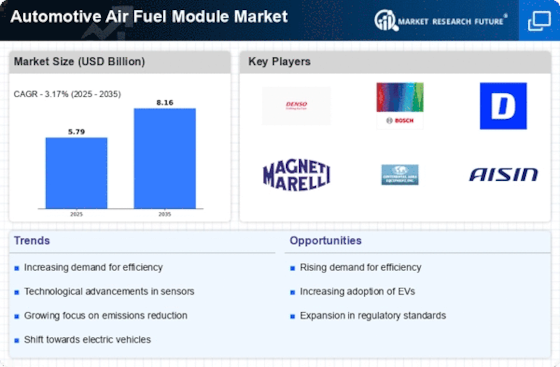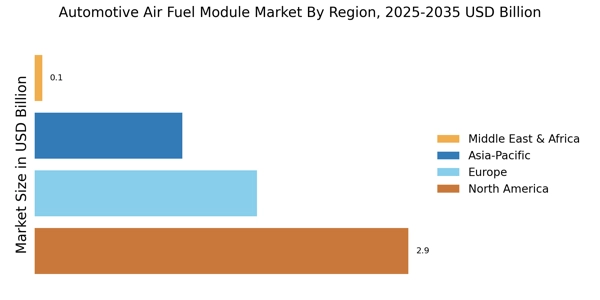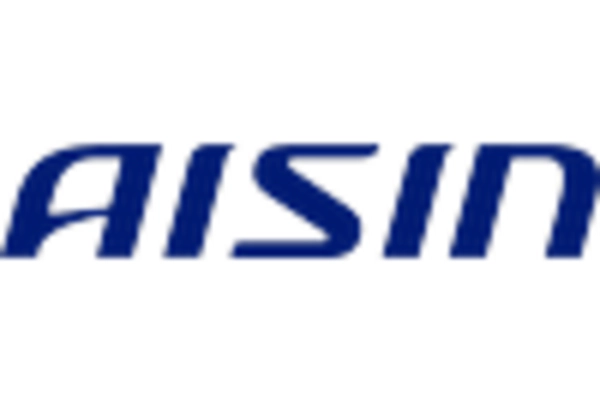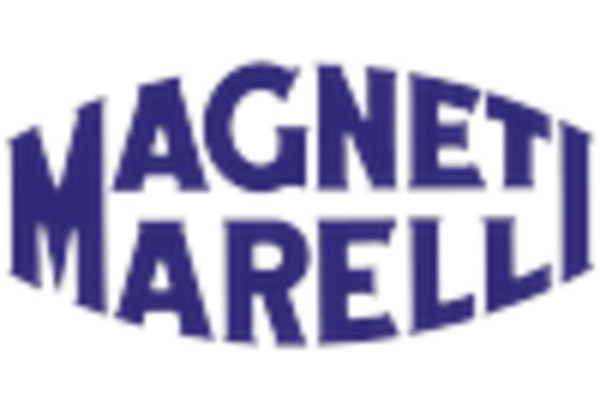Stringent Emission Regulations
The Automotive Air Fuel Module Market is significantly influenced by stringent emission regulations imposed by governments worldwide. These regulations aim to reduce harmful emissions from vehicles, compelling manufacturers to adopt advanced air-fuel management technologies. Compliance with these regulations often requires the integration of sophisticated air-fuel modules that can accurately control emissions. Data indicates that regions with the strictest emission standards are witnessing a 20% increase in demand for advanced air-fuel systems. As regulatory bodies continue to tighten their standards, the Automotive Air Fuel Module Market is likely to experience sustained growth, driven by the need for compliance and innovation in emission control technologies.
Rising Adoption of Electric Vehicles
The shift towards electric vehicles (EVs) is influencing the Automotive Air Fuel Module Market in multifaceted ways. While EVs do not rely on traditional air-fuel modules, the increasing prevalence of hybrid vehicles necessitates advanced air-fuel management systems to optimize performance. Market analysis indicates that the hybrid vehicle segment is expected to grow at a compound annual growth rate of 10% over the next five years. This growth is likely to create opportunities for manufacturers specializing in air-fuel modules, as they adapt their technologies to meet the demands of hybrid systems. The Automotive Air Fuel Module Market must evolve to align with this transition, ensuring that it remains relevant in an increasingly electrified automotive landscape.
Increasing Demand for Fuel Efficiency
The Automotive Air Fuel Module Market is experiencing a notable surge in demand for fuel-efficient vehicles. As consumers become more environmentally conscious, the need for advanced air-fuel management systems has intensified. This trend is further supported by data indicating that fuel-efficient vehicles can reduce carbon emissions by up to 30%. Consequently, manufacturers are investing in innovative air-fuel modules that optimize combustion processes, thereby enhancing fuel efficiency. The growing emphasis on sustainability and cost savings is likely to drive the market forward, as automakers seek to meet consumer expectations while adhering to stringent regulations. This demand for fuel efficiency is expected to propel the Automotive Air Fuel Module Market to new heights in the coming years.
Consumer Preference for Performance Vehicles
Consumer preferences are shifting towards high-performance vehicles, which is impacting the Automotive Air Fuel Module Market. Enthusiasts are increasingly seeking vehicles that offer superior acceleration and handling, necessitating advanced air-fuel management systems that can deliver optimal performance. Market trends suggest that performance-oriented vehicles are projected to account for a larger share of the automotive market, with a growth rate of approximately 8% annually. This trend is prompting manufacturers to invest in high-performance air-fuel modules that enhance engine responsiveness and efficiency. As consumer demand for performance vehicles continues to rise, the Automotive Air Fuel Module Market is expected to adapt and innovate to meet these evolving preferences.
Technological Innovations in Automotive Systems
Technological advancements are playing a pivotal role in shaping the Automotive Air Fuel Module Market. Innovations in sensor technology and electronic control units are enhancing the precision of air-fuel mixtures, leading to improved engine performance and reduced emissions. For instance, the integration of advanced sensors allows for real-time monitoring and adjustments, which can optimize fuel consumption. Market data suggests that the adoption of such technologies could lead to a 15% increase in overall vehicle efficiency. As automakers continue to invest in research and development, the Automotive Air Fuel Module Market is poised for significant growth, driven by the need for more sophisticated and efficient automotive systems.

















